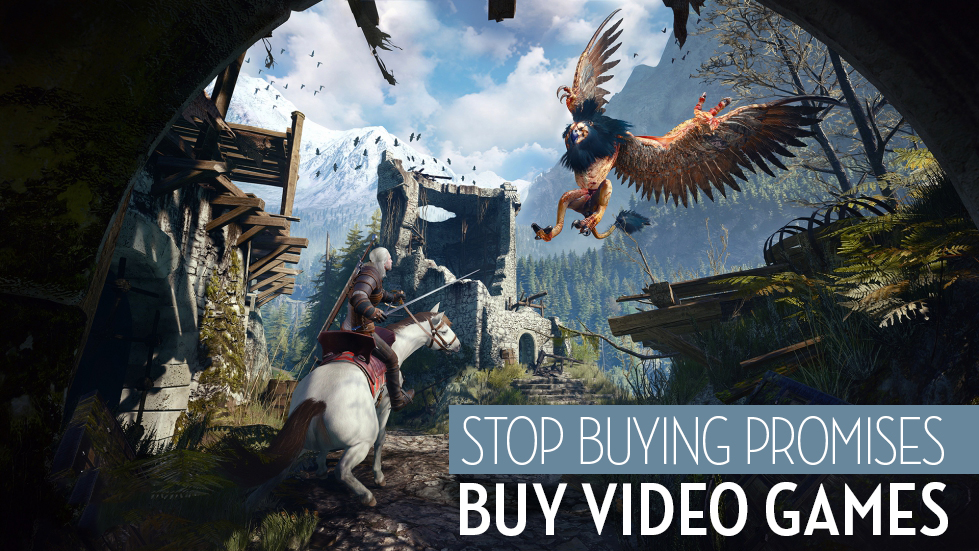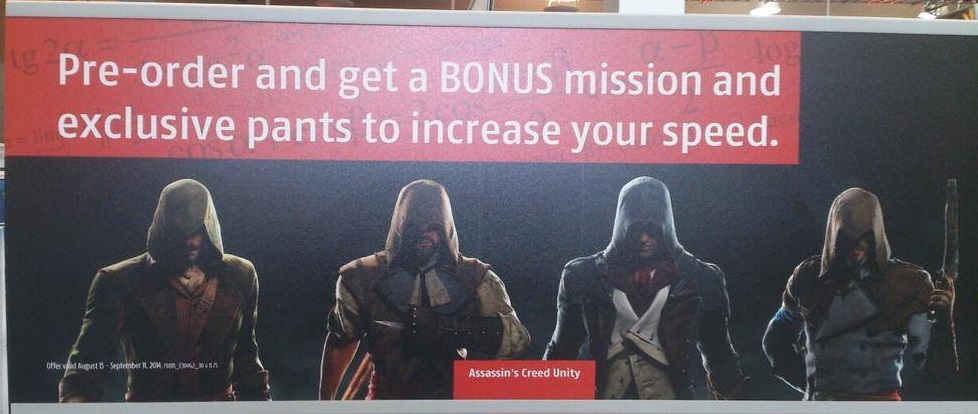
So stop preordering video games.
This isn't the first time I've said this. It won't be the last. More than anything else---the advertising, the budgets, the DLC---it's the culture surrounding preorders that is most responsible for the trail of broken and unfinished games that clutter the sales charts, and for the anger and angst that follow in its wake.
There once was a time, 10-15 years ago, when the concept of pre-ordering made sense. Every video game on the market was pressed onto a disc, and those discs had to be manufactured, shipped and sold in a store. Often, due to demand, popular games would sell out, leading to frustrated customers (and lost profits for businesses).
Soon enough, though, companies like Gamestop and Amazon figured out that if you could pay for a game before it shipped, then you could avoid missing out. Publishers would have a better idea of how many boxes they'd actually need to ship, and customers could guarantee they'd get hold of the latest game as soon as it was released, avoiding the small but genuine heartache of a sold-out sign.
It was a good arrangement! At least, it was for a time. It didn't take long for publishers and retailers to realise, though, that once a customer put their money down for a game that wasn't finished, that customer was on the hook.

Usually, preordering the game only costs a percentage of the final price. You pay a small sum up front, and the full price when you pick up the game. You may think that by putting $10 (or more!) down on a game you're interested in, you're reserving yourself a copy. Maybe getting some sweet Collector's Edition swag. But in the eyes of publishers, you're a guaranteed sale, regardless of what kind of state the game actually ships in once it's deemed finished.
This is a serious problem. There once was a time when, even moreso than advertising, video game reviews and word of mouth played the most important part in determining the success of a new game. A commercial can tell you anything, but if someone you know or at least trust has played a game you're interested in and has an opinion on it, that information is far more useful.
"This game is awesome!" is what an advertisement will tell you. "This game is kinda ok but also broken in parts and runs badly!" is what a friend or a review might say. One of those things is a lot more useful than the other.
If you're in the business of making or selling video games, opinions can be bad for business. Same goes for facts, like the fact that a game doesn't run well on PC, or the fact that the credits roll after just a few boring hours. Preordering removes both of those things from the equation. By getting your commitment to purchase a game in advance, when all you've got to go on is a marketing campaign, you're signaling that you're totally cool spending $40-$60 on a game simply on the strength of how it's been marketed.
"This game is awesome!" is what an advertisement will tell you. "This game is kinda ok but also broken in parts and runs badly!" is what a friend or a review might say.
Time was, you could download a demo of a game and try it out at home. Why have demos more or less ceased to exist? Preorders are why. Want to know why exclusive missions and items are withheld from everyone's game and are instead sprinkled across various competing retailers? Preorders are why. Want to know why it's now accepted that you can sometimes pay more for a multiplayer game and start with a competitive advantage? Preorders are why.
Last fall's Assassin's Creed Unity launched with noticeable technical issues on consoles and PC. What incentive does Ubisoft have to improve the next game in the series if people are already preordering it? What incentive does Microsoft have for learning from its disastrous Halo: The Master Chief Collection if tons of fans have gone ahead and put down money for Halo 5? Little to none.
Warner Bros.'s move to take Arkham Knight off Steam is almost unprecedented, and I'm guessing there's a reason for that: Steam's new refund policy. As Arkham Knight's PC version fell on its face, Steam users were for the first time exercising their rights en masse to get their money back. Publishers have been taking abuse and criticism for years and simply rolling with it. They'll promise fixes and sometimes they'll deliver; sometimes they won't. While I don't know how many people actually got Steam refunds for Arkham Knight, I'd guess that Warner was taking enough of a financial hit that they pulled the game---again, almost unprecedented for a AAA game like this one---and promised to come back when it was fixed.

It's 2015. Most games are available digitally. As for retail, there are vastly improved metrics for determining the popularity of a game at the time of release, so your chances of missing out on a copy at launch are slim. And even if you do miss out, it's not the end of the world: take the day or two that you're on the sideline to see if the game you thought looked cool in a trailer actually looks cool on YouTube or Twitch. See if your friend who bought it says it's fun; see what your favorite video game website thinks of it.
In terms of exclusive pre-order "goodies"... snap out of it. The stuff you're getting with "Collector's Editions" is not for collectors. It's junk. It's mostly just cheap figures and statues, useless trinkets, over-sized boxes and half-assed art books. If you really want to be a superfan and own some cool stuff associated with your favorite game, take the money you save by not buying a $100-200 Collector's Edition and go buy an actual art book, or hit up etsy and get a fan-made blaster pistol to mount on your wall. In terms of bonus skins and weapons... no matter how much you want that golden shotgun or Adam West Batman skin, consider letting it go. Even if the exclusive digital stuff is genuinely cool, like a free mission or an interesting set of in-game abilities, it's still inextricably tied to a practice designed to get as much of your money up front as possible.
There are, of course, exceptions to the rule. Lovers of obscure imported video games often need to preorder because that's the only way publishers like XSEED can get copies into stores. And while brand new games are an unknown quantity, stuff like Legacy of the Void's prologue missions---a mini-campaign available which preorder customers will get before anyone else---seems a pretty good deal. But stuff like this is the exception, not the rule.
I'm not saying stop being interested in video games. Not even upcoming ones (though it's almost always more fun to talk about games that already exist). We all love games; games are rad. People get excited about Fallout 4, about Persona 5, about Halo 5, and about whatever else. That's all cool. I'm not even suggesting that through some amazing feat of internet-enabled activism, we'll be able to collectively send publishers a message and get them to stop pushing preorders. That's never going to happen.
But when it comes down to it, preorders suck. They're a shitty practice, and they exist not to serve you, but to serve the people who sell video games. Participating in a shitty practice helps propagate that shitty practice. So stop participating.
